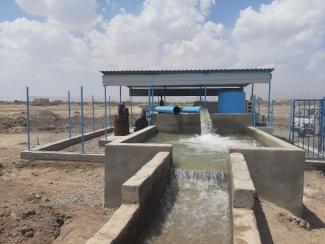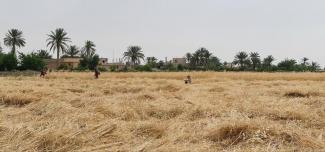Despite seeing above average rainfall this past winter, northeast Syria is still grappling with long-term climate challenges such as drought and reliable access to water. Farmers in Deir ez-Zour who produce essential crops for the region, such as wheat, are most impacted by these climate conditions. They must also deal with inefficient or dysfunctional irrigation networks that have deteriorated over time and from conflict, which increases farming costs.
“We had lost hope in cultivating our lands due to the high farming costs and a lack of irrigation,” said local farmer Bilal*.
In 2022, USAID partnered with a local civil society organization, farmers, and agricultural authorities and identified the rehabilitation of the Aliat Irrigation Complex as a critical step to increase local farmers’ crop production. The Aliat facility is important for many farmers due to its strategic location near fertile croplands and water sources from the nearby Euphrates River. USAID helped install generators and solar power systems for reliable energy, refurbished mechanical and electrical water tanks and pumps to power the irrigation canals and repaired concrete culverts for efficient water flow. After several months of rehabilitation work, the facility is now operational and is jointly managed by a local farmers' cooperative and a local authoritative agriculture committee.
“The level of food production is now much higher due to increased water access. Farmers can now plant various crops including cotton, corn, fruits, and potatoes, increasing the overall food supply to residents,” says Suleiman**, the head of the Aliat facility.
USAID’s rehabilitation of the facility had immediate results for local farmers, even before its completion. Many farmers reported they were confident to plant more wheat seeds for the 2023 harvest than in previous years because of the anticipated irrigation improvements from the Aliat facility. Farmers were so confident in USAID’s rehabilitation work that 650 hectares of land were planted this season–double the area of planted land from previous years. The increase reflects Syrian farmers’ confidence in USAID as a reliable partner.
“We now feel encouraged to use all of our lands and can plant crops during the summer months since there is an increase in irrigation water, which has reduced the financial hardships on farmers like myself,” said Bilal.
USAID is partnering with communities liberated from ISIS such as this one to restore power, water, and irrigation services and revive high-growth sectors of the economy, such as agriculture production. Through these partnerships, USAID is alleviating a food security crisis in northeast Syria and empowering communities to address the underlying causes of human suffering in Syria. USAID will remain in touch with farmers near the Aliat facility to gather data on crop yields for the 2023 harvest season and continue to help them forge prosperous futures for their families and communities.
*Name changed to protect identity.
**Name changed to protect identity.

Blumont

Blumont
